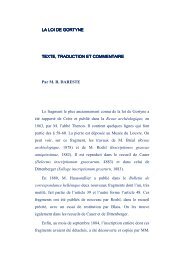CYPRIOT GRAMMAR
CYPRIOT GRAMMAR
CYPRIOT GRAMMAR
Create successful ePaper yourself
Turn your PDF publications into a flip-book with our unique Google optimized e-Paper software.
Εννά φεύκει που το πρωϊν.<br />
He will keep leaving every morning.<br />
Εννά τον σπιάζουμαι κάθαν βολάν που εννά έρκεται.<br />
I will be suspecting him every time he will come here.<br />
Εννά συνοπλάσκιουμαι εγιώ μιτά του.<br />
I will be keeping him company/conversing with him.<br />
Εννά τσ’εκκαρίζουμαι κάθαν ημέραν.<br />
I will be having a check up every day.<br />
Εννά κατσαφαλώννουνται έτσι όπως εννά έρκουνται.<br />
They will be falling down/getting injured the way they will be coming.<br />
36.3 When to use and how to form the Future Perfect (Συντελεσμένος Μέλλοντας)<br />
The Future Perfect in Greekcypriot is used when we are referring to actions that will have already happened in the future before another<br />
action takes place. A common word particle that it is used with this tense is ‘πιλέ’ meaning ‘already’ and precedes or follows a sentence<br />
starting with ‘πριν να’ (before) or ‘ως την ώραν που’ (by the time).<br />
Its formation is very simple since it uses the particle ‘εννά’ meaning ‘will’ with the Present Perfect. Therefore:<br />
Future Particle ‘will’ + Present Perfect<br />
Σύνδεζμος Μέλλοντα ‘εννά’ + Παρατζ’είμενος<br />
Φερειπείν<br />
Εννά χω πάει ειστήν εκκλησ’άν πιλέ, πριν να έρτω δαμέ.<br />
I will have already been to the church before I come here.<br />
Εννά σ’εις μαειρέψει το φαϊν, ως την ώραν που εννά ρτουσιν οι ξένοι.<br />
You will have cooked the meal by the time the guests will come.<br />
Εννά σ’ει πλύνει τα πκιάτα, πριν να πάει να ππέσει.<br />
He/she/it will have washed the dishes before she goes to bed.<br />
Εννά χομεν πάει πιλέ ειστήν Σκάλαν, ως την ώραν που εννά πάεις εσούνι ειστην Χώραν.<br />
We will have already been to Larnaca before you will have been to Nicosia.<br />
Εννά σ’ετε τραουήσει τα τραούθκια, πρίν να αρκινέψουσιν οι χοροι.<br />
You will have sung the songs before the dancing starts.<br />
Εννά χουσιν/χουν φύει πιλέ, ως την ώραν που εννά σκολάσεις.<br />
They will have already left by the time you will get off work.<br />
Εννά τον σπιάζουμουν αν έρκετουν συνέχειαν.<br />
I will have suspected him if he was coming all the time.<br />
Εννά συνοπλάσκιουμουν εγιώ μιτά του.<br />
I will have keeped him company/conversed with him.<br />
Εννά ετσ’εκκαρίζουμουν ως γύρισημερος.<br />
I will have had a check up until tomorrow.<br />
Εννά εκατσαφαλώνουνταν έτσι όπως έρκουνταν.<br />
They will have fallen down/gotten injured the way they were coming.<br />
36.4 When to use and how to form the Conditional (Ποχετικός Μέλλοντας)<br />
The Conditional in Greekcypriot is used when we are referring to actions that could have happened usually under certain conditions or<br />
which could have happened but haven’t because of a change in the conditions. The sentence following or preceding the conditional can be<br />
in the conditional if the sentence is totally hypothetical or any other tense referring to a change in the condition.<br />
Its formation is very simple since it uses the particle ‘εννά’ meaning ‘will’ with the Imperfect. Therefore:<br />
Future Particle ‘will’ + Imperfect<br />
Σύνδεζμος Μέλλοντα ‘εννά’ + Παρατατικός<br />
Φερειπείν<br />
Εννά επήαιννα ειστήν εκκλησ’άν, πριν να έρκουμουν δαμέ.<br />
I would go to church before I would come here/ I would have gone to church before I would have come here.<br />
Εννά εμαείρευκες το φαϊν, ως την ώραν που εννά έρκουνταν οι ξένοι.<br />
124





